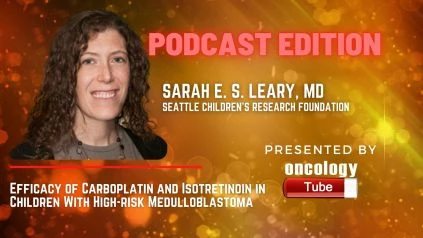Sarah E. S. Leary, MD, Associate Professor, Center for Clinical and Translational Research, at the Seattle Children’s Hospital Research Foundation speaks about Efficacy of Carboplatin and Isotretinoin in Children With High-risk Medulloblastoma.
Link to Abstract:
https://jamanetwork.com/journals/jamaoncology/article-abstract/2782033
Points to Remember
Question Is it possible to increase survival in children with high-risk medulloblastoma by using carboplatin during radiotherapy or isotretinoin during maintenance chemotherapy?
Findings
Isotretinoin did not enhance survival in this randomized clinical study including 261 children with medulloblastoma. Only children with high-risk group 3 medulloblastoma benefitted from the inclusion of carboplatin after radiation, with survival increasing from 54% to 73%.
Meaning
Because the inclusion of carboplatin during radiotherapy is advised for high-risk group 3 medulloblastoma but not for other molecular subgroups, the outcomes of this randomized clinical study suggest that prospective molecular and clinical risk assessment for medulloblastoma is required.
Abstract
Importance Children’s brain tumors are the primary cause of disease-related mortality. The most prevalent malignant embryonal brain tumor, medulloblastoma, requires new techniques to improve survival.
Objective
In a randomized clinical trial, to evaluate therapy intensification with carboplatin as a radiosensitizer and isotretinoin as a proapoptotic agent in children with high-risk medulloblastoma, and to facilitate planned subgroup analysis according to World Health Organization consensus molecular subgroups of medulloblastoma with a correlative biology study.
Participants, Design, and Setting
From March 2007 through September 2018, a randomized clinical phase 3 study was performed. In September 2020, the analysis was concluded. Patients with newly diagnosed high-risk medulloblastoma aged 3 to 21 years were included from Children’s Oncology Group facilities in the United States, Canada, Australia, and New Zealand. Metastasis, persistent illness, and widespread anaplasia were all high-risk characteristics.
Interventions
Patients were given 36-Gy craniospinal radiation and weekly vincristine with or without daily carboplatin, followed by 6 cycles of maintenance chemotherapy with cisplatin, cyclophosphamide, and vincristine, with or without 12 cycles of isotretinoin during and after maintenance.
Main Results and Metrics
The log-rank test was used to compare arms in the clinical trial. The major clinical trial endpoint was event-free survival. The molecular subgroup categorization by DNA methylation array was the major biology study end objective.
Observations
After central radiologic and pathologic review, 261 patients with medulloblastoma were evaluable; median age, 8.6 years (range, 3.3-21.2); 183 (70 percent) male; 189 (72 percent) with metastatic disease; 58 (22 percent) with diffuse anaplasia; and 14 (5 percent) with residual disease greater than 1.5 cm2. Overall survival was 73.4 percent and event-free survival was 62.9 percent (95 percent CI, 55.6 percent -70.2 percent) for all participants (95 percent CI, 66.7 percent -80.1 percent ). Due to the futility of the isotretinoin randomization, it was terminated early. With carboplatin, five-year event-free survival was 66.4 percent (95 percent CI, 56.4 percent -76.4 percent ) vs 59.2 percent (95 percent CI, 48.8 percent -69.6 percent ) without carboplatin (P =.11), with the effect observed exclusively in group 3 subgroup patients: 73.2 percent (95 percent CI, 56.9 percent -89.5 percent ) with carboplatin vs 53.7 percent (95 WNT pathway active, 100 percent (95 percent CI, 100 percent -100 percent ); SHH pathway activated, 53.6 percent (95 percent CI, 33.0 percent -74.2 percent ); group 3, 73.7 percent (95 percent CI, 61.9 percent -85.5 percent ); and group 4, 76.9% (95 percent CI, 61.9 percent -85.5 percent ). (95 percent CI, 67.3 percent -86.5 percent ).
Conclusions and Implications
Therapy intensification with carboplatin increased event-free survival by 19 percent at 5 years for children with high-risk group 3 medulloblastoma in this randomized clinical study. The importance of an integrated clinical and genetic risk assessment for medulloblastoma is further supported by these findings.
Trial Registration ClinicalTrials.gov Identifier: NCT00392327 :
https://clinicaltrials.gov/ct2/show/NCT00392327

